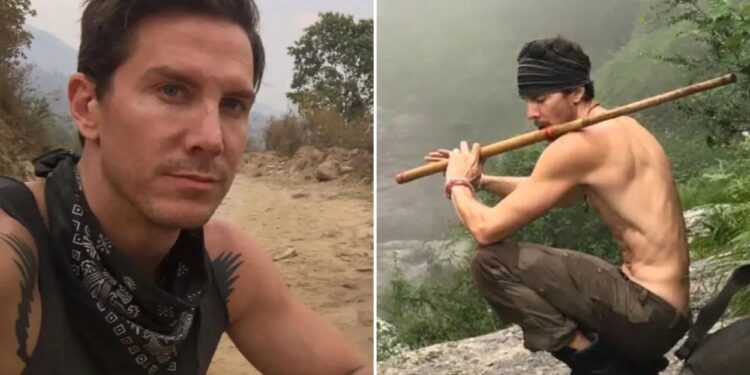
On Sept. 3, 2016, Justin Alexander Shetler was traveling in the Parvati Valley of India, carrying nothing more than a walking stick he turned into a flute and a woolen wrap.
The Oregon native was never seen again.
Now, the case of the missing survivalist is being explored in the Tenderfoot TV podcast “Status: Untraced.” It is hosted by Liam Luxon, who aims to find out what happened to the now-43-year-old.
“The story itself is just so intriguing and bizarre,” Luxon told Fox News Digital.
“Justin is a survival expert, so if somebody was living off the grid, it would be him. He has all the training for it. He knows how to speak bird language, which is crazy. He lived in a cave. He can start a fire from anywhere.”
“One of the last things he wrote on his blog and social media was, ‘I should be back, but if I’m not back by then, don’t come looking for me,’” Luxon shared. “It was weird – everything was really, really weird.”
For the podcast, Luxon connected with many of Shetler’s loved ones, including friends, family members, wilderness survival trainers and mentors.
“I know that a lot of people do have as much closure, enough closure for them, to believe what they believe,” said Luxon. “There are certainly a lot of theories that have been put out. We crossed off some while we were investigating. I can’t speak about how other people feel. But I do personally believe I know what happened. And I think most of his loved ones believed they knew what had happened as well.”
According to Outside Online, there is only one road in and out of the Parvati Valley, one that is so narrow that buses swerve with inches to spare as they pass. Some cliffs drop hundreds of feet down to the Parvati River.
Its water, named after the Hindu goddess of fertility and devotion, can be “a powerful, violent force” despite its seemingly serene blue waters.
“We got a lot of firsthand accounts of people who were with him,” said Luxon.
“In the last month that we know where he was, he was living in a cave… which is in a camp in the Himalayas. It’s gorgeous. It looks like this medieval, military town. He was staying just outside this camp, but it was four hours from the nearest road. You have no choice but to hike there.”
“When he was there, he met this… Indian holy man,” Luxon continued.
“This guy invited him to go on this trek into the mountains to this place, where the Hindu god Shiva supposedly meditated for like 3,000 years. It’s a very holy place. We do know that he hiked up to this mountain. He also hiked with two people… It’s very common for someone to go missing in the mountains. But it was that message he wrote beforehand – don’t look for me.”
It would not be until mid-September when one of his pals started reaching out to mutual friends wondering what happened to Shetler. Something was odd.
“Justin’s mom and a friend flew over there to try to get more answers,” said Luxon. “They got there in October. Other people had passed him on the trail. They said he was heading down and there was only one path going up and down. I’ve made the trek now, and it certainly seemed like he would’ve made it back to the camp. And again, this guy is a survival expert. It wasn’t like he was deep in the desert with no water and nothing around him for days. He should have made this trek. Nothing added up.”
The Parvati Valley is a popular refuge for travelers on a spiritual quest. Many find themselves here to meditate, practice yoga or simply enjoy their solitude.
However, the valley also holds dark secrets.
Over the past 25 years, according to both official and unofficial reports, at least two dozen foreign tourists have died or disappeared in and around the Parvati Valley, Outside reported.
According to the outlet, it is well-documented to see distraught loved ones post stories of the missing on social media, online message forums and travel boards in hopes anyone with information will come forward. The destination has since garnered the nickname “The Valley of Death.”
Since Shetler’s disappearance, numerous conspiracy theories have emerged, attempting to explain what happened to him.
Some claimed he was murdered, while others alleged he was a victim of a local mafia. Many wondered if Shetler slipped and fell into the river. Others insist that there are travelers who simply do not want to be found. Maybe Shetler was one of them.
“The area he’s in is notorious for missing international travelers,” said Luxon.
“The mafia and drug trade is supposed to be highly prevalent there… But Justin had given up everything. He didn’t have a job anymore. He was trying to raise money for a school in Nepal that was helping to build after an earthquake. He was traveling around at his own expense… But that’s what also made him such an inspirational figure.”
“The fact that he’s still missing is so challenging to accept,” Luxon admitted.
“He’s trained for this. He trained Marines on how to survive in the wilderness. He knows what he’s doing. The question of what happened to him is one I asked throughout the whole show. And I think anybody who first learns about his disappearance will ask the same question. What happened to Justin? I don’t know if there will ever be a full answer to that.”
Luxon said there is no denying Shetler had a deep passion for travel but was also yearning to escape.
In his travel blog, “Adventures of Justin,” Shetler wrote, “I am running from a life that isn’t authentic… I’m running away from monotony and towards novelty; towards wonder, awe and the things that make me feel vibrantly alive.”
At one point, he joked to a friend, “If I die, write something nice about me on Facebook.”
While Shetler’s iPhone, which he used to document his travels on social media, has never been recovered, his belongings were discovered scattered around the Parvati Valley, Outside reported.
The National Missing and Unidentified Persons System reported that there was no indication that Shetler had returned to the United States. It noted that the Lake Oswego Police Department is handling the case.
Luxon is hopeful the podcast can prompt new leads.
“I think one of the weirdest things about this entire thing has been grieving for somebody I’ve never met,” said Luxon. “But I do feel like I know him now. I spent hundreds of hours talking to loved ones. It is heavy. But Justin also changed my life.
“… One thing I learned from his family and friends was that he wanted to inspire people to find themselves. That was his legacy. He wanted people to… find a sense of purpose. I hope that’s one thing people take away from his life. And also, everyone is human. Even your heroes are human. Don’t be afraid to check in on them.”



























